Related Research Articles
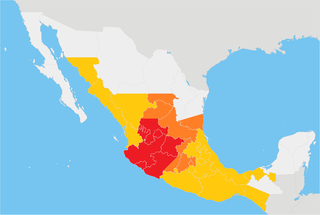
The Cristero War, also known as the Cristero Rebellion or La cristiada, was a widespread struggle in central and western Mexico from 3 August 1926 to 21 June 1929 in response to the implementation of secularist and anticlerical articles of the 1917 Constitution. The rebellion was instigated as a response to an executive decree by Mexican President Plutarco Elías Calles to strictly enforce Article 130 of the Constitution, a decision known as the Calles Law. Calles sought to limit the power of the Catholic Church in Mexico, its affiliated organizations and to suppress popular religiosity.
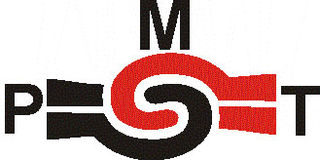
The Mexican Workers' Party was a left-wing Mexican political party, that had legal registration in the 1980s, its main political figures were Heberto Castillo and Demetrio Vallejo.
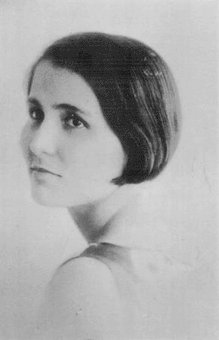
Clara González (1898–1990) was a Panamanian feminist, lawyer, judge, and activist. She became the first Panamanian woman to earn her Bachelor of Law Degree in 1922. The same year, she created the Partido Nacional Feminista to campaign for women's rights and suffrage. González was central to the work of the Inter-American Commission on Women, collaborating with activists from Latin America and the United States to study the condition of women across the Americas and to recommend reforms. González remained a vital organizer for women's rights in Panama for decades and ran for political office after Panamanian women were granted voting rights in 1945. She later became the first Panamanian woman to serve as a juvenile court judge, where she assisted in drafting the Panamanian juvenile code.
The First Conference of the Communist Parties of Latin America was in Buenos Aires, Argentina, June 1–12, 1929. Thirty-eight delegates, representing Argentina, Brazil, Bolivia, El Salvador, Guatemala, Cuba, Colombia, Ecuador, Mexico, Panama, Paraguay, Peru, Uruguay, and Venezuela, took part in the meeting. The only established communist party in the region that did not participate was the Communist Party of Chile, which at time suffered a period of harsh repression under the government of Carlos Ibáñez del Campo.
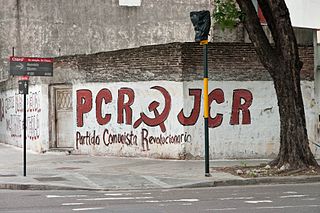
The Revolutionary Communist Party is a Marxist–Leninist–Maoist political party in Argentina.
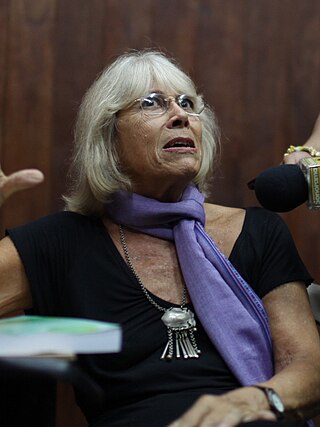
Marta Harnecker was a Chilean journalist, author, psychologist, sociologist, and Marxist intellectual. She studied the analysis of labor movements and acted as an advisor to the government of Cuba, and worked with left-wing political movements within Latin America. She was active in the government of Salvador Allende between 1970 and 1973, and provided advice to Hugo Chávez between 2004 and 2011.
The Socialist Party was a Panamanian left-wing political party created in 1933 by intellectuals and labor unionists who split off from the Liberal Party and rejected the Communist Party.
The Popular Union Party was a Panamanian centrist liberal political party.
The Mexican People's Party was a political party in Mexico, founded in 1977. PPM was led by Alejandro Gascón Mercado. PPM was mainly based in the Nayarit and Jalisco states.

The 1943 Argentine coup d'état was a coup d'état on 4 June 1943 that ended the government of Ramón Castillo, who had been fraudulently elected to the office of vice-president before succeeding to the presidency in 1942 as part of the period known as the Infamous Decade. The coup d'état was launched by the lodge of the "United Officer Groups", a secret military organization of nationalist nature. Although its soldiers shared different views of nationalism: there were Catholic nationalists, Radicals, military with a more pragmatic approach, and even fascists. The military was opposed to Governor Robustiano Patrón Costas, Castillo's hand-picked successor, a major landowner in Salta Province and a primary stockholder in the sugar industry. The only serious resistance to the military coup came from the Argentine Navy, which confronted the advancing army columns at the Navy Petty-Officers School of Mechanics.

The Revolutionary Left Front is a political party in Bolivia, founded in 1978.
¡Aquí Está! was a Venezuelan weekly newspaper, the central organ of the Communist Party of Venezuela. ¡Aquí Está! was founded in 1942 by Miguel Otero Silva, as the Venezuelan political climate was liberalized under Isaías Medina Angarita. ¡Aquí Está! substituted the previous Communist Party organ El Martillo, which had been re-launched in 1938. ¡Aquí Está! was marked by a 'Browderist' editorial line. Apart from Otero Silva, other editors of ¡Aquí Está! were Carlos Augusto Léon and Ernesto Silva Tellerías. The newspaper was published from Caracas. Through ¡Aquí Está! the Communist Party was able to win a considerable influence over the urban intelligentsia.
Búfalos is the name attributed to paramilitary squads connected to the APRA Party in Peru, originating in the 1930s. The name of the group was taken from Manuel 'Bufálo' Barreto, who had led an attack on the O'Donovan military base in 1932. Búfalos have traditionally acted as bodyguards of APRA leaders. In the discourse of APRA chief Victor Raúl Haya de la Torre, búfalos would be responsible for crowd control during mass rallies.

The Labour Gathering Party was a political party in Argentina, led by José Penelon. It emerged from a dissident wing of the Communist Party of Argentina in the late 1920s. The party would exist for decades, mainly based in Buenos Aires, but its influence waned over the years.
Allan Adolfo Zambrana Salmerón is a Nicaraguan lawyer, politician and trade unionist.
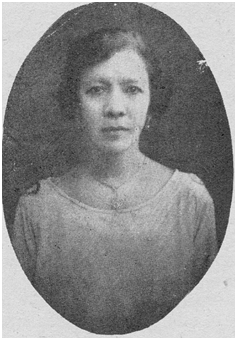
Tomasa Ester Casís was a Panamanian teacher and woman's rights activist. She founded the first women's cultural society in the country and pressed for women's equality. Supporting suffrage, she was one of the pioneering feminists of Panama and was honored as a commander in the Order of Vasco Núñez de Balboa for her educational contributions to the country.
"La Media Vuelta" is a song written and performed by Mexican singer José Alfredo Jiménez released in 1963. One of Jiménez' most famous compositions, the song has become part of the traditional Mexican musical repertoire, and has been recorded by dozens of singers and groups.
Anarchism in Panama began as an organized movement among immigrant workers, brought to the country to work on the numerous megaprojects throughout its history.
Anarchism in El Salvador reached its peak during the labour movement of the 1920s, in which anarcho-syndicalists played a leading role. The movement was subsequently suppressed by the military dictatorship before experiencing a resurgence in the 21st century.
Anarchism in Guatemala emerged from the country's labor movement in the late 19th century. Anarcho-syndicalism rose to prominence in the early 20th century, reaching its peak during the 1920s, before being suppressed by the right-wing dictatorship of Jorge Ubico.
References
- 1 2 Ricaurte Soler (1 January 1989). Panamá: historia de una crisis. Siglo XXI. p. 59. ISBN 968-23-1553-0.
- 1 2 3 Revista cultural lotería: L. Lotería Nacional de Beneficencia. 1999. pp. 9–10.
- 1 2 3 John W. McCauley (1967). The Changing Relationship Between Nationalism and Radicalism in Panama Since 1945. Michigan State University. Department of History. pp. 91–92.
- ↑ Manuel Caballero (6 June 2002). Latin America and the Comintern, 1919-1943. Cambridge University Press. p. 8. ISBN 978-0-521-52331-8.
- ↑ Pablo González Casanova (1984). Historia del movimiento obrero en América Latina. Siglo Veintiuno Editores. p. 298. ISBN 9789682312298.
- ↑ Gregorio Selser (1994). Cronología de las intervenciones extranjeras en América Latina: 1899-1945. UNAM. p. 473. ISBN 978-968-36-7797-6.
- ↑ Political parties of the Americas: Canada, Latin America, and the West Indies. V. 1. Edited by Robert J. Alexander. Westport, Conn.: Greenwood Press, 1982. Pp. 566.